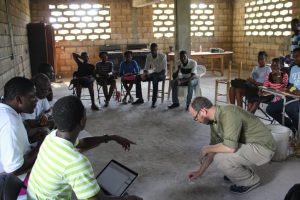Guest blog by Matt Styslinger, Stop Hunger Now Food Security and M&E Manager, and Silvia Roscot, Stop Hunger Now Technical Advisor for Food Security Crisis.
We are in Poteau, Haiti this week conducting a baseline assessment–a starting point for future research–with longtime Stop Hunger Now partner Hearts and Hands for Haiti. This research aims to provide a deeper understanding of household poverty and food security levels in the geographic area served by Hearts and Hands for Haiti, and to establish a baseline of metrics to compare to and gauge improvements over time.
Hearts and Hands for Haiti distributes Stop Hunger Now meals to its Poteau orphanage and to several schools across northern Haiti. At the Siloe Mission site in Poteau, Hearts and Hands for Haiti used Stop Hunger Now funding to drill a well to irrigate several acres of cropland they cultivate to supplement the Stop Hunger Now meals, and to support the organization with profits earned from selling produce.
 Before traveling to Haiti, Stop Hunger Now’s Monitoring, Evaluation, and Aid Distribution team designed a baseline survey including questions that capture information on household food consumption and hunger, income poverty, access to water and sanitation facilities and hygiene practices. Last week, we recruited a team of 11 young Haitians in Poteau to conduct the survey, along with a survey supervisor. We led a two-day training session with the local survey team on how to administer the survey to ensure accurate responses. With participation and feedback from the team, we refined the survey, which is written in both English and Haitian Creole (one of the two official languages, the other being French).
These research methods were new to the survey team. While they were reserved and uncertain at first, before long, the team was fully engaged and eager to offer critical insights and ideas. The depth of hunger- and poverty-related issues in Haiti presents unique challenges for undertaking this kind of research, and the survey team took full ownership in finding collective solutions to those challenges. This group brought a rare level of enthusiasm and resourcefulness to the training and the process of making practical decisions on how to run the survey.
Conducted on mobile phones using an application called Open Data Kit (ODK) Collect, completed surveys are submitted daily from the phones to a cloud-hosted database. The survey has been built so that we are able to analyze the results in real-time — effectively reducing human error and allowing us to monitor the progress of each survey taker as they work. The survey team was eager to do technical research on accessible technology that they use in their daily lives.

As the team continues to conduct the survey in randomly selected communities in the coming days, we are collecting qualitative information from local stakeholders about Hearts and Hands for Haiti’s current and future work through interviews and observation. The research will be compiled into a report of findings along with a set of recommendations for more comprehensive programming that addresses food needs.
In our discussion with Siloe Mission Founder Perre Nadieul, he emphasized the need to graduate their school meals program from reliance on food donated from overseas. “I’m looking forward to a day when we can say: ‘We don’t need Stop Hunger Now meals any more,’†Nadieul said. “Send them somewhere else to those who need them more than us.’â€
The baseline assessment will inform the design of Stop Hunger Now-supported agricultural programming in Poteau that will help them do just that. The agriculture program will also aim to engage the surrounding community to address the root causes of the poverty and food insecurity they so often face. “People here want to work, but they don’t have opportunities,†Nadieul said. “We need Haitians to change Haiti and become self-sufficient.â€
From the Field: Stop Hunger Now...
 "
"